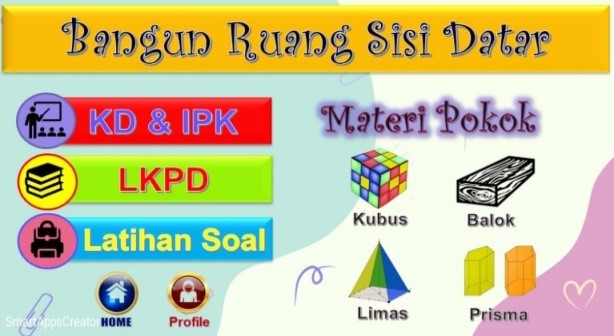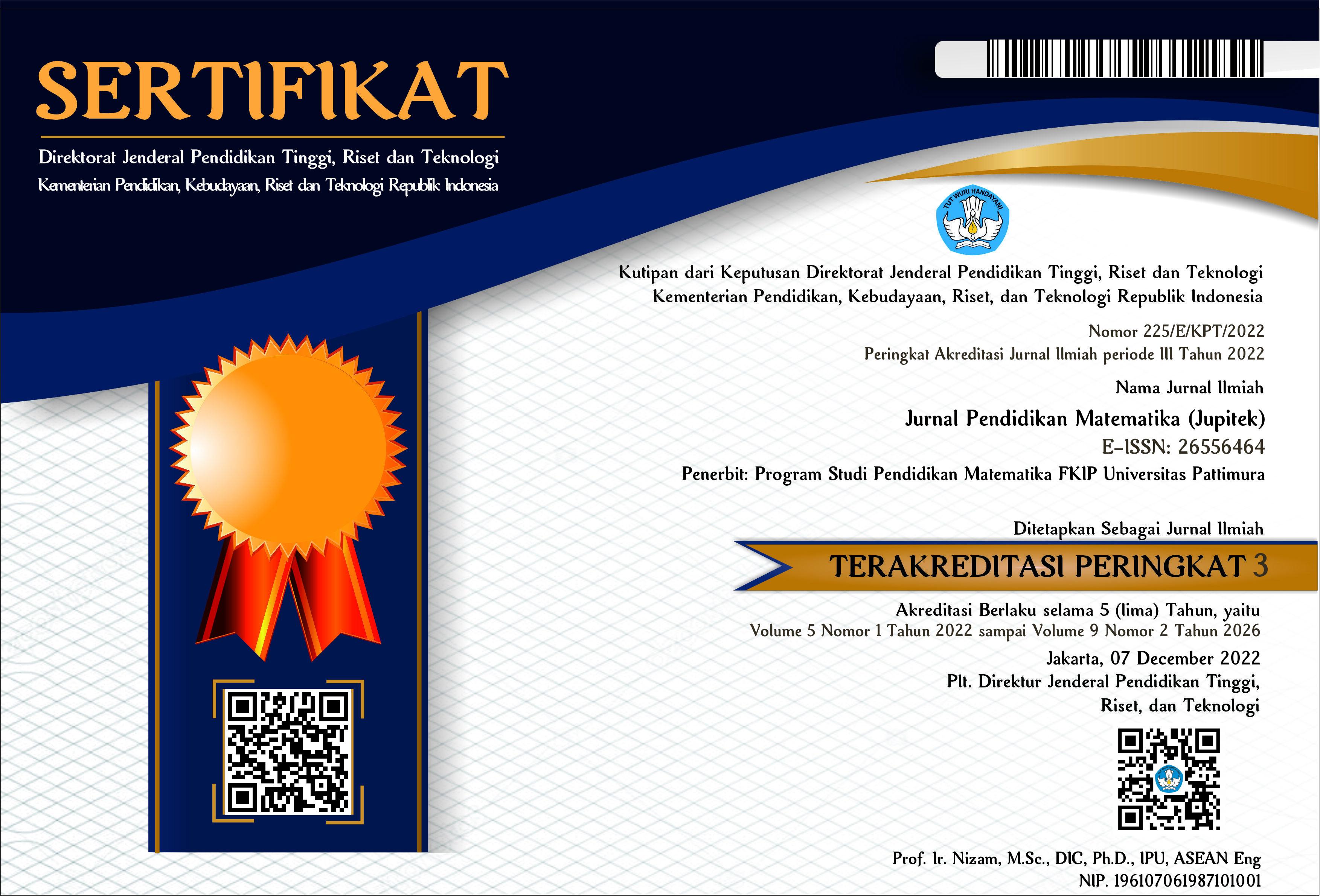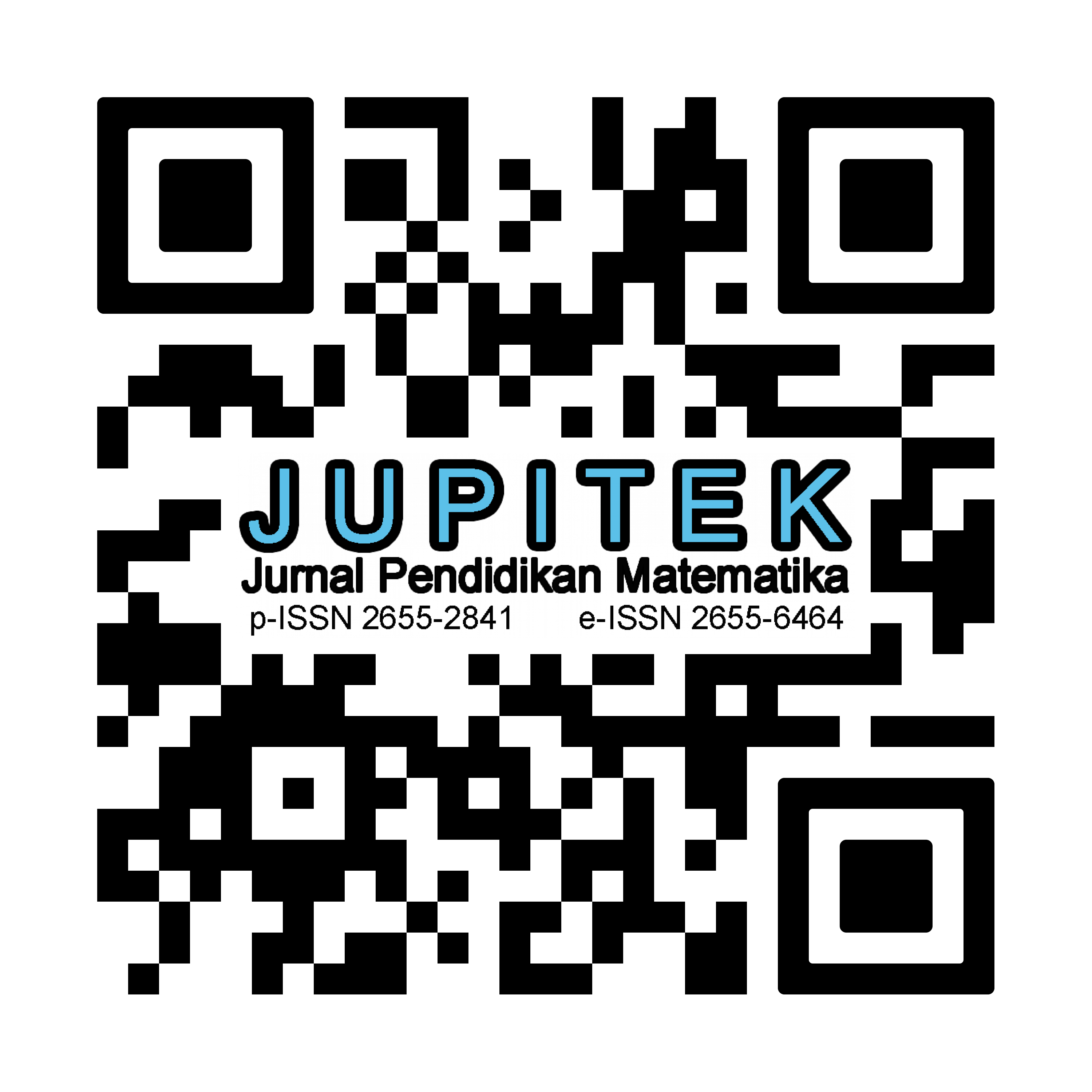EFFECTIVENESS OF PBL-BASED MOBILE LEARNING TO IMPROVE STUDENTS' CRITICAL THINKING SKILLS
Abstract
The purpose of this research is to evaluate whether or not students in the eighth grade at SMP Negeri 2 Betara in the Tanjung Jabung Barat Regency can improve their mathematical critical thinking skills by using mobile learning that is based on problem-based learning (PBL). The participants in this research were all eighth-graders from one junior high school in the Tanjung Jabung Barat Regency. There were a total of 128 students included in this study, and they were distributed across four classes. The sample was selected from as many as two classes, specifically VIIIA with a total of 28 students serving as the experimental group and VIIIB with a total of 28 students serving as the control group. The analysis of the data reveals that the Zcount value is 10,099, and the significance value is 0.000< 0.005; these values were determined to be significant. Therefore, the working hypothesis or alternative hypothesis that was proposed in this study is accepted. It states that there is a difference in the average critical thinking of students who use PBL-based mobile learning compared to students who use standard teaching materials. While the null or nil hypothesis, which states that "there is no difference in the average critical thinking of students who use PBL-based mobile learning and students who use conventional teaching materials," is rejected.
Downloads
References
Adolphus, Aderonmu, Telima, & Temitope. (2012). Comparative analysis of problem-solving ability among JSS mathematics students using computer-assisted instruction blended with problem- solving approach ( CAI-PS ) versus traditional teaching approach ( TTP ) in teaching basic statistics. American Journal of Scientific and Industrial Research, 1966, 81–85. https://doi.org/10.5251/ajsir.2012.3.2.81.85
Arisoy, B., & Aybek, B. (2021). The Effects of Subject-Based Critical Thinking Education in Mathematics on Students’ Critical Thinking Skills and Virtues. Eurasian Journal of Educational Research, 92, 0–3. https://doi.org/10.14689/ejer.2021.92.6
Asmar, A., Arnellis, A., & Sriningsih, R. (2020). Implementation of the 21st Century Skills to High Order Thinking Students ’ Mathematical in Senior High School Padang. Journal of Physic: Conference Series, 1554(012080), 1–8. https://doi.org/10.1088/1742-6596/1554/1/012080
Astuti, I. A. D., Dasmo, D., Nurullaeli, N., & Rangka, I. B. (2018). The impact of pocket mobile learning to improve critical thinking skills in physics learning. Journal of Physic: Conference Series, 1114.
Attewell, J., Smith, C. S., & Douch, R. (2009). The Impact of Mobile Learning : Examining What It Means for Teaching and Learning. LSN.
Bariyyah, K. (2021). Problem solving skills : essential skills challenges for the 21st century graduates. Educatio, 7(1), 71–80.
Cavus, N., & Uzunboylu, H. (2009). Improving critical thinking skills in mobile learning. Procedia - Social and Behavioral Sciences, 1(June 2014), 434–438. https://doi.org/10.1016/j.sbspro.2009.01.078
Chinnappan, M., & Lawson, M. J. (2005). A framework for analysis of teachers’ geometric content knowledge and geometric knowledge for teaching. Journal of Mathematics Teacher Education, 8(3), 197–221. https://doi.org/10.1007/s10857-005-0852-6
Chinnappan, M., & Thomas, M. (2015). Technology in Mathematic Learning and Teaching. Mathematics Education Research Journal, 12(July), 173–176. https://doi.org/10.1007/BF03217083
Herdianto, E. N., Mardiyana, & Indriati, D. (2021). E-book Based on Mobile Learning Used Problem Based Learning ( PBL ) Model to Improve Problem-Solving Ability in Statistical Material. Journal of Physics :Conference Series, 1808(1808), 1–7. https://doi.org/10.1088/1742-6596/1808/1/012066
Ismail, N. S., Harun, J., Aman, M., Megat, Z., & Salleh, S. (2018). The Effect of Mobile Problem-Based Learning Application DicScience PBL on Students’ Critical Thinking. Thinking Skills and Creativity. https://doi.org/10.1016/j.tsc.2018.04.002
Khambari, M. N. M., Luan, W. S., & Ayub, A. F. M. (2010). Technology in Mathematics Teaching : The Pros and Cons. Procedia - Social and Behavioral Sciences, 8(5), 555–560. https://doi.org/10.1016/j.sbspro.2010.12.077
Kim, K. M., & Md-ali, R. (2017). GeoGebra : Towards Realizing 21 st Century Learning in Mathematics Education. Malaysian Journal of Learning and Instruction, special, 93–115.
Mariani, R., & Marzal, J. (2021). Pengembangan Media Mobile Learning dengan Pendekatan Saintifik Berbasis Keterampilan Berpikir Kritis Matematis Siswa Kelas XI Madrasah Aliyah. Jurnal Cendikia, 05(03), 3295–3310. https://link.springer.com/article/10.1007/s10857-005-0852-6
Nainggolan, D. Y. (2020). Penerapan Model Problem Based Learning (PBL) untuk Meningkatkan Kemampuan Berpikir Kritis Siswa Berbantuan Aplikasi Math Mobil Learning. Cartesius : Jurnal Pendidikan Matematika, 3(1).
Opticia, N. N., & Khabibah, S. (2022). Development of guided inquiry model mathematics learning tools to practice critical thinking skills for students in linear program materials. International Journal of Trends in Mathematics Education Research, 5(2), 133–140.
Prasetyowati, D. (2016). Efektivitas Mobile Learning pada Mata Kuliah Geometri dengan Pendekatan Matematik Realistik Ditinjau dari Kemampuan Berpikir Kritis Mahasiswa. AKSIOMA: Jurnal Program Studi Pendidikan Matematika, 6(1), 1–8.
Rice, M. E., & Harris, G. T. (2005). Comparing effect sizes in follow-up studies: ROC area, Cohen’s d, and r. Law and Human Behavior, 29(5), 615–620. https://doi.org/10.1007/s10979-005-6832-7
Sachdeva, S., & Eggen, P. (2021). Learners ’ Critical Thinking About Learning Mathematics. International Electronic Journal of Mathematics Education, 16(3).
Sadiyyah, R. S. H., Gustiana, M., Punuluh, S. D., & Sugiarni, R. (2019). Pengembangan Lembar Kerja Siswa (LKS) dengan Pendekatan Inkuiri Terbimbing Berbasis Mobile Learning untuk Mengoptimalkan Kemampuan Berpikir Kritis Matematis. Prisma, VIII(1), 80–95.
Santoso, F. A., & Soedjoko, E. (2019). The problem solving ability of 7 th grade students on problem based learning assisted by mathematics mobile learning application. Unnes Journal of Mathematics Education Reseaerch, 8(2), 89–97. https://doi.org/10.15294/ujme.v8i2.32284
Setyarto, A., Murtiyasa, B., & Sumardi. (2020). Development of 21 st Century Skills in Mathematics Learning with STEAM in MTs Negeri 2 Wonogiri. Universal Journal of Educational Research, 8(20), 5513–5528. https://doi.org/10.13189/ujer.2020.081155
Suh, J., Matson, K., Seshaiyer, P., Jamieson, S., & Tate, H. (2021). Mathematical Modeling as A Catalyst for Equitable Mathematics Instruction : Preparing Teachers and Young Learners with 21st Century Skills. Mathematics, 9(162).
Sunismi, Fathani, A. H., & Baidawi, M. (2019). Strengthening of Mathematics Character Education Students (Teacher Candidates) in Facing the Challenges of the 21st Century. Advances in Social Science, Education and Humanities Research, 349(Iccd), 522–524.
Supandi, S., Handayanto, A., & Aini, A. N. (2019). The Effect of Mobile Phone Application on Mathematics Learning : Students Critical Thinking Skills. Advances in Social Science, Education and Humanities Research, 287(March). https://doi.org/10.2991/icesre-18.2019.32
Thurm, D., & Barzel, B. (2022). Teaching mathematics with technology : a multidimensional analysis of teacher beliefs. Educational Studies in Mathematics, 109, 41–63

Copyright (c) 2022 Irawati Irawati, Nizlel Huda, Sandra Sukmaning Adji

This work is licensed under a Creative Commons Attribution-NonCommercial-ShareAlike 4.0 International License.
License and Copyright Agreement
By submitting a manuscript to Jurnal Pendidikan Matematika (JUPITEK), the author(s) certify and agree to the following terms:
- Originality and Authority: The submitting author is authorized by all co-authors to enter into this agreement. The manuscript describes original work that has not been published previously in a peer-reviewed journal, nor is it under consideration for publication elsewhere.
- Approval: Its publication has been approved by all author(s) and by the responsible authorities of the institutions where the work was carried out.
- Rights: The authors secure the right to reproduce any material that has already been published or copyrighted elsewhere.
- Licensing and Copyright: Authors retain the copyright to their work.
- License Grant: The authors grant Jurnal Pendidikan Matematika (JUPITEK) the right of first publication, with the work simultaneously licensed under the Creative Commons Attribution-NonCommercial-ShareAlike 4.0 International (CC BY-NC-SA 4.0).
- Self-Archiving: Authors are permitted and encouraged to deposit the published version of their article in institutional repositories, on their personal websites, and other academic platforms, with proper acknowledgment of its initial publication in Jurnal Pendidikan Matematika (JUPITEK).





.png)


